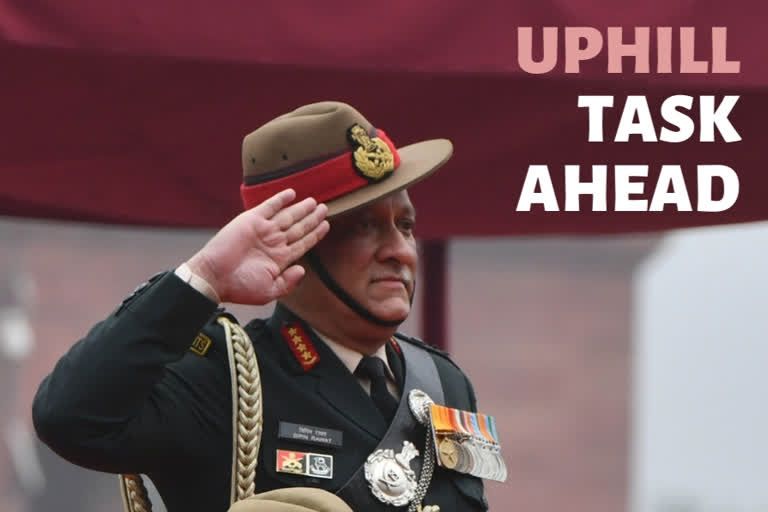New Delhi: A day before he was to retire, Army chief General Bipin Rawat was officially named as India’s first Chief of Defence Staff (CDS) by the Ministry of Defence on Monday night. It was along expected lines and is rather a continuation of his 41-year-long military career than a retirement.
On a cold and foggy winter morning on Tuesday, the CDS designate handed over the baton to General Manoj Mukund Naravane, even as he assumes the new responsibility that comes with a new mandate and a new charter.
General Rawat will man the ‘first among equals’ post—the CDS, army, navy and IAF chiefs will all wear four stars—which can be crisply described as a ‘one-stop window’ for military advice on financial and administrative matters for the Indian Army, the Navy and the Air Force. His responsibilities will also encompass the upcoming cyber and space warfare domains, and the strategic (read nuclear).
At the same time, a CDS bereft of an operational responsibility does raise questions on the efficacy of the military mandate of the CDS-designate.
Having led the Indian army in one of the most action-packed Army chief tenures in the recent past, General Rawat faces quite a few uphill challenges.
Read: General Bipin Rawat appointed as India's first Chief of Defence Staff
Having superseded two of his service seniors (the then Eastern Army commander Lieutenant General Praveen Bakshi and then Southern Army commander Lieutenant General Pattiarimal Mohamadali Hariz) on December 31, 2016, to lead the 13-lakh-strong Army, there was expectation that General Rawat would demonstrate attributes and bring to the table ‘something extra’ which would justify his selection as the Army chief.
But then General Rawat demits office amid a feeling in certain quarters among both serving and veteran officers that he could have perhaps done more to further their cause especially by being more supportive on the one-rank-one-pension (OROP) and the disability criteria issues. In his tenure as CDS, he may opt to assuage the hurt feelings.
There is also a feeling among some veterans that the General, in recent times, may have been outspoken in his views which to their mind dimmed the lines between military professionalism and the pure political standpoints and positions.
With the military’s increasing involvement in issues of internal security, General Rawat’s interactions with the home ministry, paramilitary and police forces, intelligence bureau, and others would count for much in that sense.
In a fast-changing military world, General Rawat will have to focus his energies on achieving perfect coordination between the three wings of the armed forces and other commands including cyber and to channelize the efforts in the right direction. This is particularly critical in the backdrop of the changing warfare styles as modern wars are expected to be short, intense, net-centric and devastating. Therefore the preparations would be far more different than it has been in the past. This in itself is a point of departure that General Rawat would have to address.
Read: All you need to know about the Chief of Defence Staff
In effect, the CDS’ prime effort will be directed towards setting up of the architecture for theatre commands which would itself involve landmark changes in the very way the army, navy and IAF operates.
With the country’s economy depicting a gloomy outlook, the General is likely to have a tough time balancing the equipment acquisition costs from the scarce funds available. Without doubt, listing of priorities would be foremost on his mind even as the modernization effort of the armed forces would be a no-compromise issue and would have to go on unhampered.
After having assumed a cutting-edge role and having redefined military diplomacy especially in Myanmar, Bhutan, Bangladesh, Nepal and Sri Lanka in the backdrop of India’s ‘Neighbourhood First’ policy, General Rawat’s task is easily cut out—to further expand cooperation, increase involvement and infuse aid without being seen as trying to be domineering. This in itself is easier said than done as Asian giant China is also fighting for competing space in South Asia and to expand its area of influence.
To be fair, General Rawat has assumed the first-ever CDS’ post at a time when the Indian military establishment is at a cusp. A professional soldier that he is, General Rawat can only be expected to give his best… the rest is, as they say, for history and posterity to play judge.



